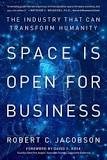The Industry that Can Transform Humanity
By Rox Burkey
I was delighted to receive a pre-release copy of this book to read and provide an honest review.
Where to start and how to categorize this book by Robert C. Jacobson? This is one of those books that teaches more the further you read. I found it remarkably easy to read and be consumed by what it offered. This is non-fiction, yet it reads well like a great blog or lecture. Author Jacobson begins by making a good case for the technology aspects of putting satellites into space to benefit mankind. He doesn’t dwell on the nerdy issues of satellite telecommunications. He explores how they can be leveraged to solve planetary problems of GPS locations of maritime traffic, agriculture conditions, weather forecasting, water location, and dozens of other issues that had escaped my notice before this book.
Jacobson really dove into space commercialization like nobody’s business. I liked how he discussed not only rocket ships, but communications, space-driven data, microgravity research, space resources and mining them, space-land with colonization, the use of robotics, space generated energy, and other in-space services. For me the most compelling argument of all was taking heavy manufacturing and placing it in space to help combat environmental pollution.
If you’re looking for a heavy dose of astrophysics mumbo-jumbo you will be disappointed. This book is first and foremost a genuine dive into the business eco-system of startups, existing aerospace giants, and the well-known government agencies. Jacobson candidly identifies how the dynamics of space business has changed.
First Jacobson presented a great current picture of the aerospace industry. Then he launches into the financial dynamics of underwriting these endeavors not so much from the governments but from private sector Venture Capitalists. I found it personally fascinating as he explains the practice of issuing pre-IPO shares in some of these startups using blockchain accounting techniques. This provides liquidity to these space startups that might take 10 to 15 years to earn investment payback, rather than today’s 7 years for a normal terrestrial company. How cool is that?
Space is Open For Business is an excellent progression from the practical discussion of what is happening right now in this New Space environment. Then quickly takes up the argument of why invest outside the planet. This specifically covers the sticky question of why invest in space when we have so many problems right here on Earth. I believe you will see that his arguments (along with the quotes of many experts) are compelling for investing in space to SAVE our planet.
You are probably groaning with the thought of reading something that sounds like a dull, tedious college textbook, right? The writing will surprise can captivate you as the prose in Jacobson’s book is an easy read. It is carefully written to be a page turner, and you won’t want to stop. It is riddled with expertly captured quotes from the people who are making the New Space environment blossom. He even pokes a little fun at the industry’s use of acronyms most notably NASA’s Commercial Crew and Cargo Office or C3PO. (Somebody at NASA has watched Star Wars too many times).
The book has so many important experts quoted, it was challenging to single one out. But I’m going to do it anyway, because I have found Jeff Bezos a fascinating businessman.
Jeff Bezos: “Infrastructure is always expensive. Amazon was easy to start because the transportation system was already in place, payment systems existed, so the Internet could ride on top of them. All those things would have cost billions of dollars. You cannot start an interesting space company today from your dorm room; the price of admission is too high and the reason for that is the infrastructure doesn’t exist today. So my mission with Blue Origin is to help build that infrastructure, that heavy lifting infrastructure, so that future generations will be able to stand on top it the way I was able to stand on top of the US postal service and so on.”
Hope they save a space on the next launch for me!
Robert C. Jacobson is a multifaceted entrepreneur, industry leader, and mentor with over ten years of experience advising private investors in the potential of the space program. His professional career has been characterized by an innate talent for early recognition of transformative industry developments, such as emerging sectors, new business trends and cycles, and enabling technologies.
Robert was one of the earliest members and a principal with Space Angels (formerly Space Angels Network), the first space-focused angle group in the world and leading source of capital for aerospace startups. At Space Angels, his extensive network in the space industry was instrumental in developing strategic partnerships with other space organizations and recruiting early members for the group. He later cofounded The Aerospace & Defense Forum, a global aerospace and defense leadership community that currently consists of over 2,000 industry senior executives and professionals. In 2017, Robert became one of the first team members of Arch Mission Foundation and was subsequently part of the three successful space missions: the Solar Library payload in Elon Musk’s Tesla Roadster, now orbiting the Sun (via SpaceX Falcon Heavy, 2018), the Leo Library, with the first English copy of Wikipedia in low Earth orbit (via a SpaceChain CubeSat, 2018), and Lunar Library, a thirty million-page archive on the Moon (via SpaceIL’s Beresheet Moon lander). Today Robert serves as the founder and chief executive officer of Space Advisors, a financial and strategic consulting firm that mentor’s startups and advises provide investors in the potential of the space program for the benefits of humanity.
You can find and follow Robert on Facebook – LinkedIn – Personal Website – Twitter – Instagram








